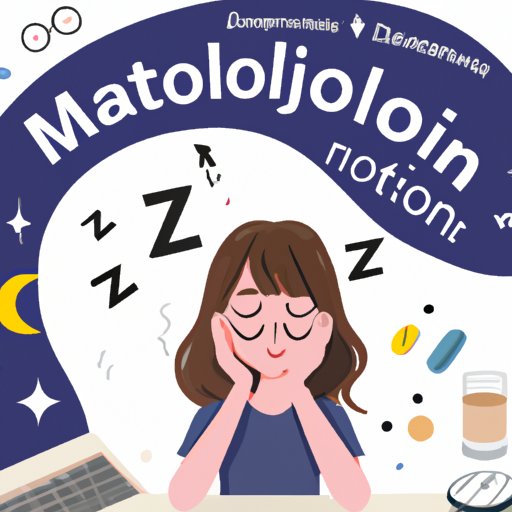
Introduction
Are you one of the millions of people who can’t seem to get a good night’s sleep? Have you turned to melatonin for help? Melatonin is a hormone produced naturally in the body that helps regulate your sleep-wake cycle. However, one of the most widely reported side effects of taking melatonin is daytime sleepiness or grogginess. This article aims to provide guidance on how to maximize the benefits of melatonin while minimizing the unwanted side effects.
The Truth About Melatonin and Daytime Sleepiness
Melatonin is a hormone produced by the pineal gland in the brain that helps regulate the body’s sleep-wake cycle. It does this by signaling to the brain that it’s time to sleep. Melatonin is produced in response to darkness and is suppressed by light.
The level of melatonin in your blood rises in the evening, making you feel drowsy, and falls in the morning, making you feel alert. This feedback loop helps regulate your sleep-wake cycle.
However, taking too much melatonin can result in significant side effects, including daytime sleepiness. Excessive melatonin levels can interfere with your body’s natural sleep-wake cycle, including your ability to wake up in the morning.
Feeling Groggy in the Morning? Melatonin may be the Culprit
When taken too close to waking, melatonin can cause grogginess the next day, especially if you’re not getting enough sleep. Research suggests that taking melatonin before bed can interfere with natural REM sleep cycles and cause vivid dreams, unrefreshing sleep, and grogginess.
While melatonin can help you fall asleep faster, it can make you sleepy the next day, particularly if you take it in high doses. Timing is critical if you’re going to take melatonin. Taking melatonin too close to your preferred wake-up time can result in drowsiness, fatigue, or irritability.
Busting the Myth: Does Melatonin Really Make You Groggy?
There’s mixed evidence on whether melatonin really causes grogginess. According to a study published in the Journal of Clinical Sleep Medicine, taking melatonin at the right time hasn’t been proven to cause grogginess the next day.
However, there is no one-size-fits-all approach to using melatonin, and the effects vary from individual to individual. The effect of melatonin on each person’s sleep and wake cycle could be affected by various factors such as age, health status, diet, and lifestyle.
A Guide to Understanding the Relationship Between Melatonin and Sleepiness
Melatonin interacts with other hormones and neurotransmitters involved in sleep regulation, including cortisol and the pineal gland. The interplay among these hormones and neurotransmitters explains why taking too much melatonin can alter your sleep-wake patterns.
The optimal timing and dosage of melatonin depend on factors such as your circadian rhythm, age, and health status. For example, young adults might benefit from taking melatonin later in the evening, while older adults may do better taking it earlier.
Why Some People Experience Daytime Drowsiness After Taking Melatonin
If you still feel groggy after taking melatonin, it could be a sign of an underlying health condition or using too much melatonin. Migraine sufferers and those with chronic pain disorders, gastrointestinal disorders, or autoimmune disease may experience daytime drowsiness after taking melatonin.
It’s also essential to consult with your healthcare provider before taking melatonin regularly to rule out any underlying medical conditions that may cause sleep difficulties.
Maximizing the Benefits of Melatonin Without the Groggy Side Effects
If you’re struggling with daytime drowsiness after taking melatonin or you’re worried about the possible side effects, there are several steps you can take.
First, take the smallest effective dose of melatonin. Second, take melatonin earlier in the evening to mimic the natural rise in melatonin levels. Also, opt for time-release formulations of melatonin to achieve more sustained blood levels. And lastly, create a healthy sleep environment and follow good sleep hygiene practices.
The Dos and Don’ts of Taking Melatonin for a Restful Night’s Sleep
To get the most out of melatonin, be sure to follow these guidelines:
DO:
– Take melatonin at the same time each night
– Start with the smallest effective dose
– Take time-release formulations of melatonin
– Create a healthy sleep environment and follow good sleep hygiene practices
DON’T:
– Take melatonin too close to your preferred wake-up time
– Take melatonin if you have an underlying medical condition without consulting with a healthcare professional
– Take melatonin for an extended period without taking breaks
Conclusion
Melatonin has become a popular sleep aid, but it’s essential to use this supplement with care. Melatonin can help improve the quality of your sleep, but it can also cause grogginess and other side effects if used incorrectly. To maximize the benefits of melatonin while minimizing the side effects, it’s important to find the right dosage and the right time to take it, and to follow good sleep hygiene habits. Talk to your healthcare provider before starting with melatonin for optimal results.





